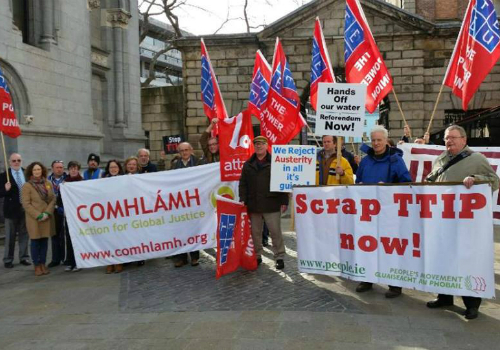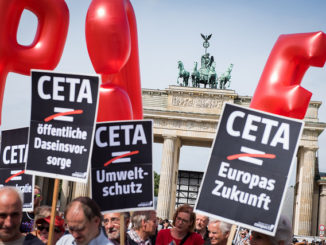 As EU Trade Commissioner Cecile Malmstrom visited Ireland last Friday, The Irish Farmers Association (IFA), Ireland’s largest farming organisation, has expressed serious concerns about the transatlantic trade and investment partnership, TTIP.
As EU Trade Commissioner Cecile Malmstrom visited Ireland last Friday, The Irish Farmers Association (IFA), Ireland’s largest farming organisation, has expressed serious concerns about the transatlantic trade and investment partnership, TTIP.
The organisation made reference to newly published Copenhagen Economics report, commissioned by the Irish government, which identifies, in the words of IFA President Eddie Downey “very negative impacts for Ireland’s vital beef sector”.
According to the IFA “following a meeting yesterday with the authors of the report, both Copenhagen Economics and officials from the Department of Enterprise Trade and Employment accepted that TTIP presented very significant risks to both our beef and white meats sector.”
Beef is the largest agri-food sector in Ireland, employing over 70,000.
The Copenhagen Economics report was commissioned to assess the potential impacts of TTIP on Ireland. While positive on potential jobs growth, citing up to 10,000 new jobs for Ireland, it also predicts that the Irish beef sector will be badly hit by TTIP.
The IFA’s new position paper on TTIP says “as a fundamental principle, EU negotiators must insist on equivalence of standards. That is, all US imports must meet the same animal health, welfare, traceability and environmental standards as is required of EU producers.”
This echoes the European Parliament report of last year , which saw the overall value of EU agriculture projected to fall by 0.5%. Irish beef, in particular the suckler cow sector, as especially vulnerable.
The IFA point to the following differences between EU and US beef production:
- The much larger scale of US production, with large ranch style extensive suckler herds and large intensive feedlots. This compares with the smaller family-farm based suckler herds in Ireland and the EU, and smaller finishing units.
- Use of hormonal and non-hormonal growth enhancers such as ractopamine and romensin, all of which are banned in the EU.
- Lower feed costs in the US, arising from the use of technologies (GMOs) in feed production.
- Fewer and less onerous animal welfare and environmental requirements in the US
- Stricter controls and conditions in animal health, animal welfare and environmental standards in the EU.
- Higher labour costs in the EU compared to the US.
They argue for equivalence of standards, designation of beef as a sensitive product and retention of some tariff controls.
In a radio feature (available to listen to outside of Ireland) on Ireland’s main radio station RTE 1 European Trade Commissioner Cecile Malmstrom, made reference to the potential of the European Globalisation Fund as a mechanism to offset jobs losses arising from a trade deal. She also refered to the fact that job growth in general will compensate for job losses in specific areas.
Tom Healy of NERI also appeared on this radio feature, where he criticised the both the Copenhagen report’s methodology and the growth assumptions for TTIP Malmstrom and others use (9 mins in). Healy drew attention to Capaldo‘s October 2014 report, which suggested a completely different picture with regard to exports, GDP and employment, where losses were assumed, along with increased financial instability.
Barry Finnegan of the TTIP.ie information network also responded to the Maelstroom visit, and the pro TTIP Irish government agenda, with range of concerns. Again, growth assumptions were a key area of criticism.
According to Finnegan:
“Malmström says TTIP will bring 0.5% economic growth. It will not! The CEPR study she relies on to claim this states it will create 0.05% economic growth each year in a best case scenario over a period of ten years of full implementation of TTIP. This annual economic growth figure is then (randomly?!) multiplied by ten for the executive summary of the study. This has resulted in the Irish government, the Commission, business lobby groups and some unsuspecting journalists claiming that TTIP will bring 0.5% economic growth”
He also pointed out that the main barriers remaining in EU US trade are non-trade barriers anyway, so it is precisely in the areas of “rules and regulations relating to democracy, public services, workers’ rights, food and the environment” where trade increases will be earmarked. Finnegan was also scathing on Investor-state dispute settlements – ISDS’s – and drew attention to criticism of the Copenhagen economic model as laid out by Ackerman and Gallagher (2008).
More
All Arc2020 TTIP news and views
All Arc2020 features on Ireland
Ireland’s TTIP information network
Recent articles by Oliver Moore
- The Great Simplification Scam
- Denmark’s ambitious Organic Plan
- The quadlemma: diet, health, environmental & hunger
- Irish Ag Minister’s Climate Change “voodoo accounting”
- Ireland organises against TTIP
- New Organic Regulation Causing Temperatures to Rise
- 4 Key Agri-Food Policy Needs
- Who is Phil Hogan?
- Ireland Improves Payments & Options for Organic Farmers
- CAP Greening: Ireland opts for path of least resistance
- European Organic Congress case profile: Terre de Liens
- EFSA slammed by Pesticide Action Network over its methods
- Antimicrobial resistance soaring
- Part 3: what did you think? Reader’s replies on livestock reduction
- Part 2: Westhoek & Sutton on Less Livestock in Europe
Filed under Latest from EU Member States, Main stories · Tagged with Ireland, TTIP





3 Trackbacks / Pingbacks
Comments are closed.